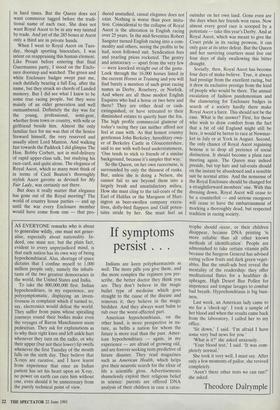If symptoms
persist . . .
AS EVERYONE remarks who is about to generalise wildly, one must not gener- alise, especially about nationality. In- deed, one must not; but the plain fact, evident to every unprejudiced mind, is that each nation has its own way of being hypochondriacal. Alas, shortage of space dictates that I confine myself to 1,000 million people only, namely the inhabi- tants of the two greatest democracies in the world, the United States and India.
To take the 800,000,000 first. Indian hypochondriacs, in my experience, are polysymptomatic, displaying an inven- tiveness in complaint which if turned to, say, electronics would defeat the world. They suffer from pains whose spiralling journeys round their bodies make even the voyages of Baron Munchausen seem pedestrian. They ask for explanations as to why their right knee and left ankle hurt whenever they turn on the radio, or why their upper (but not their lower) lip swells whenever the first Tuesday of the month falls on the sixth day. They believe that X-rays are curative, and I have learnt from experience that once an Indian patient has set his heart upon an X-ray, no power on earth can cure him without one, even should it be unnecessary from the purely technical point of view. Indians are keen polypharmacists as well. The more pills you give them, and the, more complex the regimen you pre- scribe, the better doctor they think you are. They don't believe in the magic bullet type of medicine which goes straight to the cause of the disease and removes it; they believe in the magic birdshot. And they always want balm to rub over the worst-affected part.
American hypochondriasis, on the other hand, is more prospective in na- ture, as befits a nation for whom the future is more real than the past. Amer- ican hypochondriacs — again, in my experience — are afraid of growing old, and are forever seeking tests predictive of future disaster. They read magazines such as American Health, which helps give their neurotic search for the elixir of life a scientific gloss. Advertisements shamelessly exploit their religious belief in science: parents are offered DNA analysis of their children in case a catas- trophe should occur, or their children disappear, because DNA printing 'is more reliable than all other known methods of identification'. People are admonished to take certain vitamin pills because the Surgeon General has advised eating yellow fruits and dark green veget- ables. But the small-ads best reveal the mentality of the readership: they offer meditational flutes for a healthier di- aphragm, High Desert Bee Pollen for impotence and tongue lavages to combat bad breath. Hypochondriasis is big busi- ness.
Last week, an American lady came to me for a 'check-up'. I took a sample of her blood and when the results came back from the laboratory, I called her to my office.
`Sit down,' I said. 'I'm afraid I have some very bad news for you.'
`What is it?' she asked anxiously. `Your blood test,' I said. 'It was com- pletely normal.'
She took it very well, I must say. After only a few moments of pallor, she revived completely.
`Aren't there other tests we can run?' she asked.
Theodore Dalrymple


























































 Previous page
Previous page